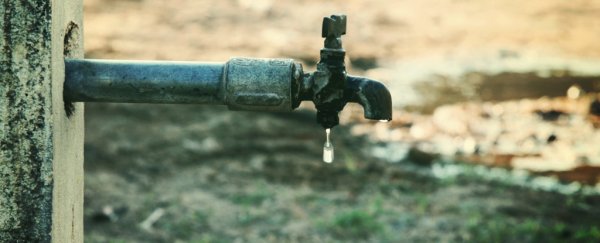Early last year, the nearly 4 million people who live in Cape Town were in a panic. Their city was three months away from becoming the first major metropolis to fully deplete its water sources, and as the saga unfolded, the whole world watched in earnest.
Today, in Chennai - India's sixth largest city - 4.6 million people have all but run out of water, and only now are we beginning to pay attention.
Amid one of India's longest heat waves in recent history and back-to-back lacklustre monsoon seasons, the Chennai Metro Water has had to cut provisions by 40 percent. For weeks now, city residents have been suffering from severe water shortages.
Water is one of the vital substances that keep human cities running smoothly; without it, many public services in Chennai, including hotels and restaurants, have had to shut down completely.
Air conditioning has been turned off in public spaces, staff are being sent home, hospitals are struggling, and every day residents must line up for hours in the searing sun, waiting for government trucks of water to be brought in from outer areas of the state.
Those who can afford it rely on private water tankers, although these are mostly inaccessible for the 820,000 people who live in the city's slums. According to a recent report from CNN, an entire family in the slums receives just 30 to 40 litres (8-10 gallons) of water a day, roughly thirty times less than the average American family.
The situation is becoming dire, and it's causing tension in the city. There are recent stories of neighbours stabbing each other over access to water, and some of those life-saving tanker trucks are reportedly being hijacked on their routes.
Just this week, the local High Court condemned the state government for inaction and lack of foresight. For weeks it has been apparent that groundwater around and in Chennai is severely depleted and that local reservoirs are cracked and dry.
Nevertheless, the government has done little other than wait for the rains to come. An official actually told BBC Tamil that, "Only rain can save Chennai from this situation." The Chief Minister himself even claimed this week that the water crisis was being blown out of proportion by the media.
Neither of these claims is true. The city has started drilling new bore holes despite the fact that groundwater is scarce. Even now, there is little to no recycling of water or rainwater throughout all of India, even though this may be the country's only solution to what is inevitably a growing problem.
The crisis may have initially erupted in Chennai, but experts suggest it's bound to pop up all over the country if current water strategies don't change. Today, around 600 million people in India face high to extreme water stress, and only about a quarter of all households have access to drinking water in the home.
Last year, a report from an Indian government think-tank warned that by 2020, 21 Indian cities, including Delhi and Bangalore, are likely to run out of groundwater, impacting both food and water security for a further one hundred million people.
"By 2030," the report predicts, "the country's water demand is projected to be twice the available supply, implying severe water scarcity for hundreds of millions of people and an eventual ~6 percent loss in the country's GDP."
This is what's at risk if India's government continues to wait for the rain.
Editor's note (24 Jun 2019): An earlier version of this article misstated the population of Cape Town; this error has now been corrected.
